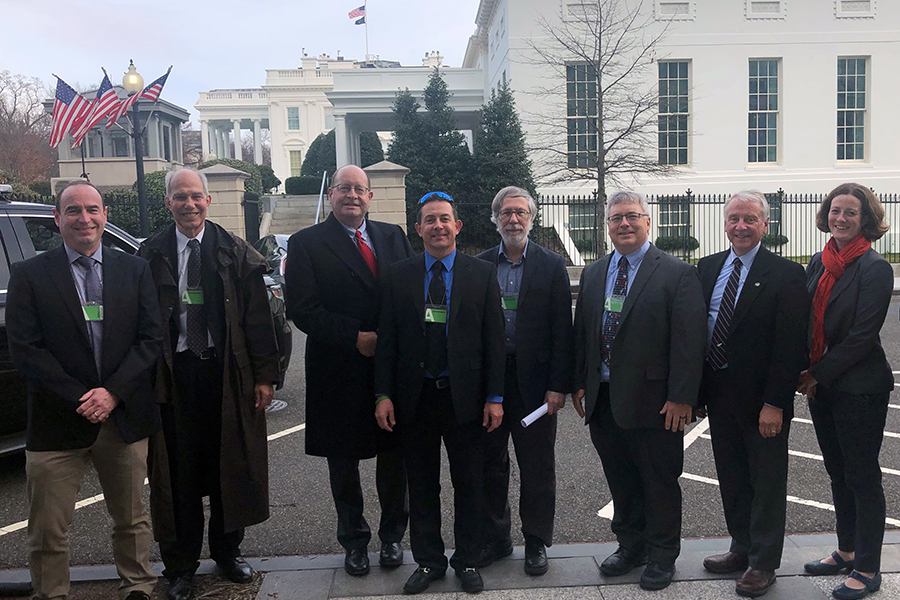Collicott selected as "engagement" award winner in College Faculty Excellence Awards
When Steven Collicott envisioned himself as an aerospace engineer, building “cool things that fly faster and higher” was the draw.
The idea he’d be walking the hall of Congress talking to non-engineers and non-aerospace people about making use of the commercial, reusable suborbital rocket industry for doing research never crossed his mind.
But as opportunities presented themselves, initially as part of the Commercial Spaceflight Federation in conjunction with the CSF’s Suborbital Applications Research Group (SARG), Collicott quickly recognized the importance of such engagement. He saw clearly the impact of engaging with external stakeholders and the mutual benefit to those stakeholders as well as Purdue Engineering research and education.
Collicott’s activities have impacted congressional funding for NASA’s Flight Opportunities Program, established new collaborations with leading commercial spaceflight companies, provided a low-cost means for K-12 educators and students to fly experiments on suborbital spaceflights and have involved countless Purdue students in the designing, building and flight testing of low-gravity experiments.
All of which have contributed to him being selected by College of Engineering with its Faculty Excellence Award for Engagement. Collicott was recognized for “his national leadership in championing new research and educational opportunities made possible by the commercial spaceflight industry” during a virtual ceremony on April 23.
“I am touched that my busy colleagues made time to compile a winning nomination for me. I thank them warmly for doing so,” Collicott said. “With all the great and varied successes that Purdue Engineering professors deliver each year, it feels a bit odd to be the one singled out for something like this. I want to mention that when invited to testify to the Senate committee and to staff of the National Space Council, both times I was delighted to participate beside Purdue engineering alums. These alums and their achievements give me great satisfaction in how Purdue Engineering launches our graduates into tremendous career trajectories.“
SARG’s engagement is with the very broad science community, with government and with the K-12 educational world. Collicott, who became chair of SARG in 2013, has had an impact in all three areas.
He has led science engagement at the Next-Generation Suborbital Researchers Conference, leading technical panels and educating others about new affordable research and educational opportunities the industry is beginning to provide.
Since 2008, he’s made trips to D.C. He’s worked to arrange annual Capitol Hill visits with U.S. Senate staffers, House staffs, Office of Management and Budget staff and National Space Council staff to offer insight into new affordable research and education opportunities in spaceflight. His most recent engagement work in D.C. has impacted the latest omnibus bill with a line item for NASA’s Flight Opportunities Program, an increase that enables substantially more flight tests and educational impact, a result of years of work by SARG under his leadership.
“It’s something else I never set out to do,” Collicott said of the national advocacy role he has assumed. “But the benefits of this new market, this new industry are quite big, for both research and education. NASA and I can fly an experiment on one of these vehicles for a few percent of the cost of an old-style suborbital rocket. It’s pennies on the dollar, compared to the traditional method, so we can get so much more science done so much more affordably.”
In K-12 engagement, Collicott blazed a trail with a West Lafayette second-grade teacher, flying the first K-12 experiment in this new suborbital industry. He followed up with the Purdue School Launchbox, which enables schools to pursue their own original experiments and affordably fly a small payload to space and back on private suborbital rockets.
Both were products of AAE418, Zero-Gravity Flight Experiment, in which Collicott has inspired and provided opportunities for Purdue students to be involved directly in designing, building and testing experiments that fly in space. He has engaged with several commercial space companies, including Blue Origin, EXOS Aerospace, Masten Space Systems, UpAerospace and Virgin Galactic.
That course spurred Collicott’s recognition as CSF’s inaugural Patti Grace Smith STEM Award Winner for his “leadership as an educator committed to scientific excellence and the expansion of knowledge for the next generation of commercial space pioneers.”

